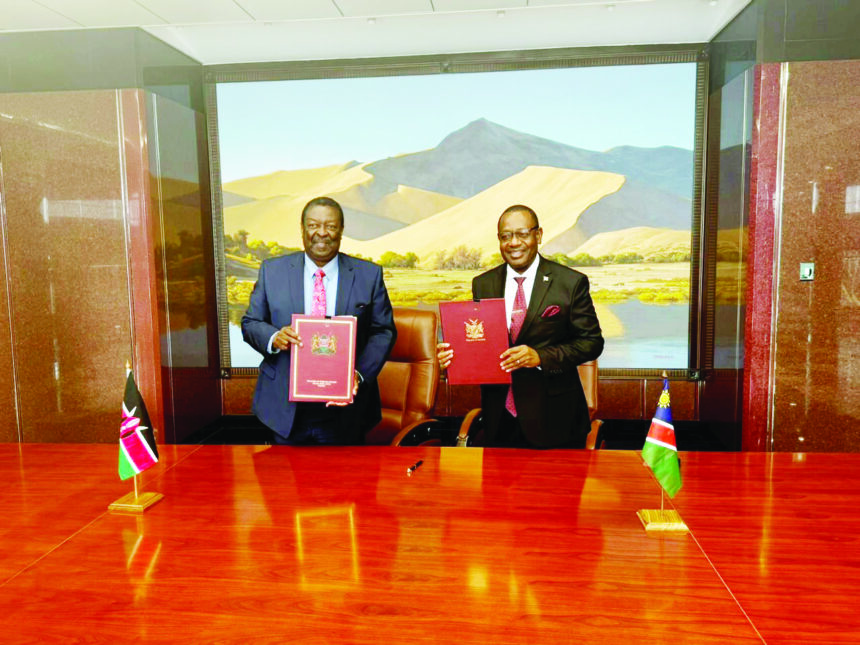While expressing confidence in veteran Kenyan politician Raila Odinga’s candidature for the African Union’s top post, Namibia has elected not to endorse anyone.
Odinga, a former Kenyan prime minister, is gunning for chairpersonship of the African Union Commission (AUC).
Namibia’s stance was elaborated by the country’s foremost diplomat, international relations minister Peya Mushelenga, following high-level diplomatic consultations between Namibia and Kenya in Windhoek.
Yesterday, Mushelenga met Kenya’s prime cabinet secretary, Musalia Mudavadi, to review several bilateral issues.
Reports from Kenya suggested that Mudavadi also used the platform to drum up support for Odinga’s AUC bid during their talks, which were held behind closed doors.
During a telephonic interview, Mushelenga explained that Namibia follows a long-standing tradition of not endorsing any candidates for such positions.
“It is our tradition that Namibia does not pronounce itself on any candidature. You have never heard about it in the past 34 years. Your question is premature,” Mushelenga said.
He further elaborated that this time, the AUC chairmanship falls under the Eastern African region.
“We believe in a rotational system to allow countries from different regions who have not yet served in such roles to contest,” Mushelenga stated.
He said Namibia will not be fielding any candidate, as the country supports the principle of regional rotation, and the AUC election process was still in its early stages.
“There are procedures to follow, including interviews and elections, which are still far off,” he said, adding that Namibia respects these formal processes but will not participate in them.
Namibia, however, believes Odinga is a worthy candidate for the AUC chair.
In contrast, Namibia’s official opposition leader, McHenry Venaani, has publicly backed Odinga’s bid, praising him as “one of Africa’s most visionary politicians.”
Odinga, a veteran Kenyan politician, is among four candidates who have declared interest in running for the position.
The others are Djiboutian foreign minister Mahmoud Ali Youssouf, Somalia’s former foreign minister Fawzia Yusuf Adam, and former Seychellois vice president Vincent Meriton. Their countries have already given them backing.
Diplomatic talks
In addition, trade, regional cooperation, and the implementation of decisions made during the inaugural session of the Namibia-Kenya Joint Permanent Commission of Cooperation (JPCC) held in 2023 were key areas of discussion.
“The progress made since the JPCC’s first session has been significant, but there is more to be done. We have directed our senior officials to fully implement all signed bilateral agreements, joint projects, and programmes,” said Mushelenga.
In the spirit of strengthening economic ties, both parties emphasised the critical role of trade in promoting economic growth.
Mudavadi said trade between Namibia and Kenya holds immense potential.
“With frameworks such as the African Continental Free Trade Area (AfCFTA) and the Tripartite Free Trade Agreement (TFTA), there are opportunities we can seize to benefit our economies and people,” he said.
Mudavadi also highlighted the potential for collaboration in key sectors such as agriculture, education, and infrastructure, noting that the two nations could play pivotal roles in boosting regional development through these sectors.
The ministers confirmed that Namibia will host the second session of the JPCC in 2025, further underscoring their commitment to deepening cooperation across multiple areas of mutual interest.
Elections
As Namibia prepares for its general elections, Mudavadi extended best wishes to the country.
“We wish the people of Namibia and all African Union member states a peaceful and successful election period,” he remarked, reaffirming Kenya’s commitment to supporting peaceful democratic processes across the continent.
The talks also addressed international and regional security issues.
Meanwhile, Kenya reaffirmed its backing of Namibia’s Anne-Marie Nainda for vice president of Interpol Africa.
Both ministers expressed concern over ongoing conflicts in Africa, especially in regions experiencing political instability and violence. They highlighted the importance of joint diplomatic efforts to address these challenges and promote peaceful resolutions.
“Peace and security are essential for the prosperity of our continent. We remain committed to working with our African and international partners to achieve lasting peace,” said Mushelenga.
The two leaders also discussed international efforts to enhance security cooperation within the AU and across the continent, expressing optimism about future collaboration.
Cooperation
The consultations concluded with both ministers expressing gratitude for the positive and constructive atmosphere of the discussions.
“Our shared values of friendship and cooperation are what make these consultations so fruitful,” said Mudavadi.
Both Namibia and Kenya aim to build on their historical ties to ensure mutual growth and contribute to the broader goals of African unity and development.
Looking ahead, the two nations continue to position themselves as key players in fostering regional development, cooperation, and security across Africa, reaffirming their commitment to strengthening their bilateral relations.
(Namibia-Kenya)



